That being said, the most widely-asked question by Giants fans (other than how the Giants are going to do in 2010, of course) has to be this:
How did the Giants do this off-season?
That is an interesting question. Of course, we won't truly know until the games start. We won't know if Mark Derosa just had a bad stretch with St. Louis because of injury, or if he is on the decline until the regular-season starts. We won't know how Aubrey Huff's defense at first will fare until the regular season starts. We won't know if Freddy Sanchez will be fully healthy again and be the NL All-Star he was in the first half of 2009 until the regular season starts.
Yet, there is one thing Giants fans can say about this off-season before the regular season starts:
Managing General Partner Bill Neukom and General Manager Brian Sabean are not a good fit for each other.
In many ways, this is a different Giants ownership from what we have seen in the past. Sure, former Managing Partner Peter Magowan is still on as a Principal Partner, but it's Neukom calling the shots, and his shots certainly have been felt this off-season if you look at the list:
- In terms of free agency, the Giants didn't sign anybody beyond a two-year contract. Freddy Sanchez and Mark Derosa both received two-year, $12 million offers. Aubrey Huff received a one-year $3 million offer. Juan Uribe received a one-year, $3.25 million offer, and Bengie Molina received a one-year, $4.5 million offer.
- The Giants didn't have to sacrifice too much in arbitration. Jonathan Sanchez earned a $2.1 million dollar extension in arbitration. Brian Wilson earned a $4.4375 million extension. And Tim Lincecum, their franchise player who had earned TWO Cy Young awards in his first TWO seasons, earned a two-year extension, but will only be paid $9 million in 2010 (he will earn $14 million in 2011).
- The Giants didn't make any serious offers to any big-time free-agents. The biggest offer they made was $19 million total to Adam LaRoche, but even then, that contract was only a two-year deal. Yes, Jason Bay, Johnny Damon and Matt Holliday didn't show interest in signing with the Giants, but it did not seem as if the Giants showed much interest in them in return.
For some reason, I can't see this conservatism from Magowan. Magowan was known for being a fan first, and he spent like a fan. If the Giants needed to make a splash in free agency (e.g. Barry Zito, Aaron Rowand, Bengie Molina, Moises Alou, etc.), Magowan opened the pocket book for Sabean and allowed him to do so. If the Giants needed to make a big trade regardless of the cost (e.g. A.J. Pierzynski for Boof Bonser, Joe Nathan and Francisco Liriano), Magowan gave gave the green flag to Sabean.
Magowan wanted the Giants to win regardless of how it affected his bottom line in the balance sheet. It worked to both the Giants fans' advantage (Three NL West titles in 1997, 2000 and 2003, and an NL Pennant and near-World Series win in 2002) and to their disadvantage (Ignoring the steroid culture during the Bonds Era, the accumulation of bad contracts and lack of farm system development).
Neukom, on the other hand, doesn't seem inclined to run things the "Magowan Way." Just from what we've seen in his first two years, Neukom seems more concerned about mitigating risk rather than making a big splash. You could see this attitude during last season's Trade Deadline. The acqusitions were modest: two players (Sanchez and Ryan Garko) for two top pitching prospects (Tim Alderson and Scott Barnes). Neither of the players the Giants recieved were premiere (and remember, Holliday and Roy Halladay were on the market), but the cost wasn't extraordinary either (remember, the Seattle Mariners gave up four prospects for Jack Wilson and Ian Snell last off-season).
To be honest, I don't think there's anything wrong with Neukom's managing style. If done properly (think the Oakland A's of the Early 2000's, the 2003 Florida Marlins and the 2008 Tampa Bay Rays) the conservative approach to building a ballclub can be worthwhile. It can not only produce immediate success, but it can set up the seeds of future success because you're relying on younger, cheaper options rather than the high-risk, high-reward players you get through free agency. Sure, it doesn't always work (Kansas City and general manager Dayton Moore have been struggling to find success through this mindset because many players haven't lived up to expectations, like Alex Gordon), but with the right people, and the right mindset, success is not just possible, it's likely.
Yet that's the problem at this current moment. Sabean is not the right person to head the kind of management style that Neukom presents. Sabean is similar to a guy like New York Yankees General Manager Brian Cashman: he needs a lot of money, and he needs to spend a lot of money to achieve success. That's what he did from 1997-2008. Magowan gave him a lot of money, and he spent it on as many free agents as he possibly could, from Dave Roberts to Steve Finley to Ryan Klesko to Rich Aurilia, version 2.5.
Unfortunately, Sabean can't do that anymore, and as a Giants fan, you can tell he's going through withdrawls about it. He wants to spend more money on guys like LaRoche or Molina (they lucked out because the market tanked on Molina), but you feel Neukom won't let him do it. So, he just goes after to whatever he can, spending it on guys who are big names, but not necessarily fits on this team.
He spends $3 million on Huff to play first base, even though Huff hasn't played first base regularly in his career. He spends $12 million on Sanchez, even though Sanchez has a questionable injury history. He spends $12 million on Derosa, even though Derosa is better suited as a complementary player for a heavily offensive lineup rather than a primary player for a team that needs offense.
And the worst part? You get this strange feeling that Sabean held back in negotiations. You feel that if Magowan were still running things Huff would get a two-year deal instead of one and Sanchez would get a four-year deal instead of two. As a Giants fan, you feel that these off-season acquisitions were not all done by Sabean, but rather, were Sabean's ideas dictated by Neukom's prices. It seems as if Neukom put a price ceiling up, said "This is the high mark, don't go beyond it," and Sabean worked accordingly, and predictably (going with questionable, in-regression veterans).
That's why Sabean and Neukom can't work. It's almost as if Neukom and his managing team are baiting Sabean to find a more efficient way of running a team. It's almost as if they are hinting to him to rely more on players in their system rather than free agents. I think that's why they gave him the two-year extension this off-season. The average age of the Giants' Opening Day lineup in 2009 was 25.67 years-old. They thought that was a sign that he would get it, and play into their "efficient spending" model.
And yet, he doesn't get it, and I don't think Sabean ever will. The projected Opening Day lineup in 2010 has an average age of 30.67 years-old. The payroll increased from just over $82 million to just over $90 million (at this point) in less than one year (and the payroll most likely will go up by Opening Day). That's not efficiency. That's not what the Marlins, A's and Rays did en route to success.
If anything, it is just ineffectiveness, compounded by ignorance.
Neukom can find success as an owner despite his "cost-conscious" ways. However, Sabean isn't going to help him achieve that success. He's only going to hinder, if not prevent it from happening. The route to success in Neukom's "style" isn't through veterans, but with youth. It isn't through big-names, but efficient, "worth more than they're paid" players.
There are two-years left on Neukom's contract, and for all we, as Giants fans, know, Sabean may be around for two more years. If that's what happens, so be it.
But it needs to be known: change is drastically needed. This off-season proved that. The Giants need a general manager that will follow the path the A's, the Marlins and Rays set forth for Major League teams that want to be efficient with money, but still competitive.
Who is that guy? I don't know, but it certainly isn't Sabean.




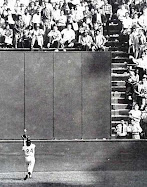
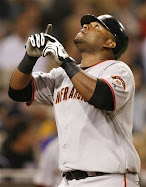

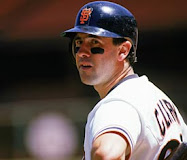
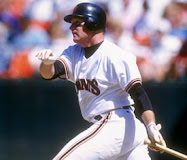
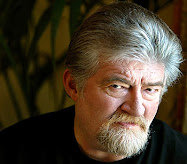

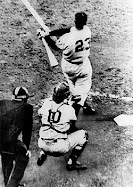
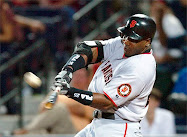
The only reason "It worked to both the Giants fans' advantage (Three NL West titles in 1997, 2000 and 2003, and an NL Pennant and near-World Series win in 2002..." was because of ONE great free agent signing, Bonds in '93; and Sabean had nothing to do with that.
ReplyDeleteHis free agent splashes, as you put it, have been disasters for the most part (Zito, Rowand, Alou, Renteria). And while DeRosa and Sanchez only have 2 year deals, every other team in baseball has managed to sign comparable players to one year deals.
Without Bonds I doubt the Giants would have even been a playoff team in any of those years. He was one of those rare hitters who affected everyone else in the lineup.
I hope you're right and that Sabean doesn't let the door hit him in the ass on the way out.
That's a good point on Bonds. Without him, I'm curious to see how Sabean would have done as general manager. Granted, he did build around Bonds well until 2005, but it was obvious that Sabean was risking his team's future at the same time.
ReplyDeleteAndrew Baggarly posted a great article describing how bad the 2004 team was and yet they still managed to be in contention for the playoffs until the last day of the season. Main reason? Bonds.
Here's the article http://blogs.mercurynews.com/extrabaggs/2010/03/02/felipe-alous-regret-from-the-wayne-franklin-game-freddy-probably-wont-be-ready-suggested-reading-material/